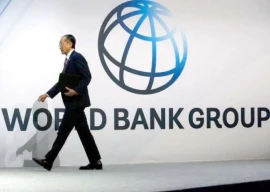
PM defers decision on new belt-tightening budget
Finance ministry proposes 31% increase in tax collection to revive IMF programme
ISLAMABAD: Prime Minister Imran Khan on Friday deferred a decision on a new budget framework after key economic ministries could not develop a consensus on presenting a belt-tightening budget due to its adverse implications for the people and the economy during the economic recession.
The Ministry of Finance presented before Premier Imran the International Monetary Fund-guided economic stabilisation framework that seeks Rs1.2 trillion fiscal consolidation in economic recession, highly placed sources told The Express Tribune.
The proposed plan also includes Rs5.1 trillion tax collection target for the Federal Board of Revenue (FBR) that will require imposition of record additional taxes of nearly Rs780 billion in the next fiscal year 2020-21. The FBR did not present the taxation measures, as in the first stage it will need the prime minister’s endorsement for the new tax target of Rs5.1 trillion.
The Ministry of Finance has also proposed two dates to present next fiscal year’s budget – June 5 or June 12 – leaving the decision to the prime minister. It also sought directions from the PM on whether to increase pay and pensions in the next budget.
The finance ministry made the first formal presentation to Imran on broader contours of the next year’s budget. It will be the third budget of the PTI government, as the PM scrambles on how to strike a balance between providing relief to the Covid-19 struck businesses and reviving the IMF programme.
The Ministry of Finance proposed Rs600 billion for development budget but the planning ministry demanded that it may be given at least Rs700 billion or else key mega projects would be affected in the next fiscal year, the sources said.
The finance ministry proposed a primary budget deficit target of Rs192 billion or 0.4% of Gross Domestic Product, as suggested by the IMF. The primary deficit is calculated by excluding interest payments from the total revenues.
The Ministry of Finance told the PM that if the government wanted to get the IMF programme back on track and bring the soaring public debt-to-GDP ratio down, it would have to present the economic stabilisation budget, the sources said. The IMF has projected the public debt-to-GDP ratio at 90% of GDP.
But the participants of the meeting questioned the finance ministry’s rationale of proposing nearly Rs3.1 trillion for debt servicing in the next budget despite a 4.2% cut in the discount rate.
The reduction in interest rates should have reduced the debt servicing cost by at least Rs700 billion but the Ministry of Finance projected higher than this year’s debt servicing cost, the sources said.
The IMF has projected Rs2.7 trillion debt servicing cost in the budget but the finance ministry has shown over Rs350 billion higher allocations, said the sources.
The fund’s one-year-old programme remains technically suspended since last month but the IMF-endorsed budget would be a guarantee to put the derailed programme back on track from the next fiscal year.
Due to differences of opinion among the key ministries and questions raised over certain proposed allocations, Imran directed the finance ministry to go back to the drawing board and rework the numbers, the sources said.
The finance ministry urged the meeting participants to suggest ways to reduce expenditures for creating room for additional spending to boost the economic growth in the next fiscal year, the sources said.
The planning ministry was of the view that savings could be made possible by making realistic projections of interest payments, debt relief from G-20 countries and cutting the losses of the public sector enterprises. The ministry argued that savings from these three heads could provide significant room for allocating additional Rs100 billion for the Public Sector Development Programme (PSDP).
The meeting participants also suggested that the government should focus more on enhancing non-tax revenues and privatisation programme instead of burdening people with additional taxes.
The planning ministry has warned that if its budget is not increased to Rs700 billion, some of the prime minister’s initiatives, China-Pakistan Economic Corridor projects and agriculture sector projects would be adversely affected.
The finance ministry has indicated an allocation of Rs600 billion for the PSDP in the next budget. The indicative budget includes Rs530 billion spending for core development activities being undertaken under the umbrella of the PSDP. The remaining Rs70 billion has been proposed for projects being administered by the finance ministry, including meeting the military’s certain development needs from the PSDP.
The Rs600 billion PSDP allocation for the fiscal year 2020-21 is Rs101 billion or 14.4% less than the original budget of this fiscal year.
The IMF has suggested that the tax collection should go up by 31% to Rs5.1 trillion in the next fiscal year, if the country is keen to keep the troubled $6 billion loan programme on track. For the current fiscal year, the IMF has projected FBR’s tax collection target at only Rs3.908 trillion.
But achieving Rs5.1 trillion target would require additional revenue measures of Rs780 billion, which would be highly unpopular due to forecast of economic recession.
Despite acknowledging that the next fiscal year 2020-21 would also be tough for Pakistan’s economy, the IMF has sought fiscal consolidation efforts to the tune of Rs1.2 trillion or 2.5% of the GDP on the back of again a steep expected increase in tax revenues.
A PM Office handout stated that a detailed presentation was made by the finance ministry about the overall situation and the performance of various macroeconomic indicators during the past nine months of the current financial year. The prime minister was also apprised of the economic impact of the Covid-19 pandemic.
“Discussing future economic outlook, the prime minister said that all efforts should be made to provide maximum possible relief to the people,” according to the PM Office.
The prime minister emphasised that priorities and targets for the next PSDP should be clearly defined with a focus on completion of the projects rather than mere initiation.
He also underscored the need for maximum utilisation of public-private partnership model and involving international development partners to enhance and broaden the scope of the PSDP.















COMMENTS
Comments are moderated and generally will be posted if they are on-topic and not abusive.
For more information, please see our Comments FAQ